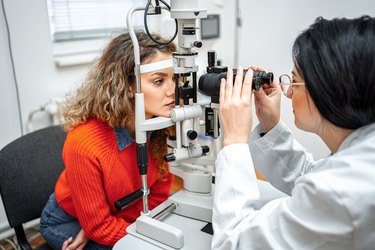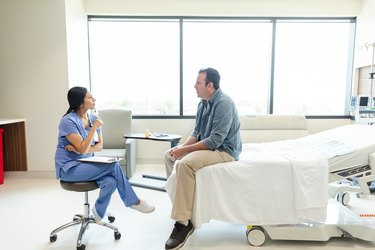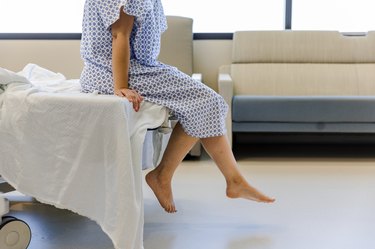
Forgot to bring your glasses to your last eye exam? Not totally sure which vision services are covered by your insurance?
Don't worry: Eye doctors say these are pretty common mistakes they see at vision centers. But learning from those mistakes and being prepared in the future is not only helpful for your doctor, but for your eye health, too.
Video of the Day
Video of the Day
Here, optometrists and ophthalmologists share the top mistakes people make at eye exams, and what you should try to do instead to get the most out of your eye appointments.
1. Not Bringing Your Glasses or Contact Lens Prescription
Even if you don't wear them regularly, it's always a good idea to bring your glasses when getting your vision checked.
In fact, wearing your glasses during an exam helps your eye doctor see what your vision is like, and how it may have changed since the last time you came in, says Roselyn Ahua, OD, FAAO, an optometrist in Concord, North Carolina.
"Beyond that, it also allows your doctor to be aware of refractive shifts that may indicate underlying issues like dry eye syndrome, cataract development, fluctuations in blood sugar levels and medication side effects," she adds.
2. Skipping the Dilated Eye Exam (or Not Being Prepared for It)
Pupil dilation — where your eye doctor puts drops in your eyes to make your pupils larger, allowing them to see the back of your eye — "is a crucial part of the eye exam," says William Hogue, OD, an optometrist with VRMNY in NYC.
"It lets us check for things like glaucoma, retinal tears or detachments, macular degeneration and hypertensive and diabetic retinopathy — which can lead to permanent vision loss if left untreated."
Yes, a dilated exam can be inconvenient, especially because it can temporarily blur your vision and make your eyes more sensitive to light (which can also make it harder to drive home). But it's worth it, experts say.
While there's no rule against driving home with dilated eyes, try to plan ahead if you think you'll have a hard time seeing.
"You can prepare by wearing sunglasses, or having someone drive you home," says James Dello Russo, MD, an optometrist at New Jersey Eye Center in Bergenfield, New Jersey. Or, take an Uber home if you can't find a designated driver.
3. Not Disclosing a Health Condition
Don't think you need to share an illness with your eye doctor if it's well-managed or doesn't seem to affect your eyes? Our experts say to think again.
"There's an intimate link between our overall health and the health of our eyes," Dr. Hogue says.
Many people, for instance, don't bother bringing up their diabetes if their blood sugar levels are managed, Dr. Dello Russo says. But "there are still ocular complications from diabetes that may happen even with stable medical conditions, which eye doctors should be made aware of," he adds.
Problems like high blood pressure and rheumatoid arthritis can affect your eyes, too, Dr. Hogue adds.
4. Skimming Over Your Medications and Supplements
On a similar note, it's also important to let your eye doctor know about all of the medications and supplements you're taking.
Sometimes medicines for non-eye conditions can affect your eyes in surprising ways. "Medications like antidepressants and birth control pills can contribute to dry eye syndrome, for instance," Dr. Hogue says.
And while there isn't much research about certain supplements causing eye issues, there is one older January 2013 review in Plastic and Reconstructive Surgery that says some supplements like niacin, echinacea and kava could make your eyes dry.
Tip
Along with prescription medications, tell your eye doctor about any over-the-counter medications, herbs, vitamins or supplements you're taking, to make sure they aren't negatively affecting your eyes.
5. Not Knowing Your Insurance Coverage Details
Some eye doctors take vision insurance, which covers all or part of the cost of your eye exam or contact lens fitting, but not treatment for eye health problems — like macular degeneration or glaucoma.
Other eye doctors may take medical insurance, which can cover treatment for eye health problems, but not the cost of your eye exam, Dr. Hogue says.
If you're seeing an eye doctor for the first time (or have had coverage changes since your last visit), call the office before your appointment to make sure they take your plan.
"Every plan varies in what they cover. It's important to understand what your plan covers before the exam, if possible, to prevent unexpected costs," Dr. Hogue says.
6. Putting Off Concerns Until Your Annual Eye Appointment
Notice your eyes are unusually dry or your vision is a little blurry, but you've still got another three months until your next scheduled vision test?
"Don't wait to tell your doctor about issues you may need relief from," Dr. Ahua says.
Getting help sooner (even if it's just learning about lifestyle strategies for reducing dryness) will help you feel better and see more clearly.
And in some cases, it could help your eye doctor catch a medical condition that needs to be treated before it gets worse.
Is this an emergency? If you are experiencing serious medical symptoms, please see the National Library of Medicine’s list of signs you need emergency medical attention or call 911.


